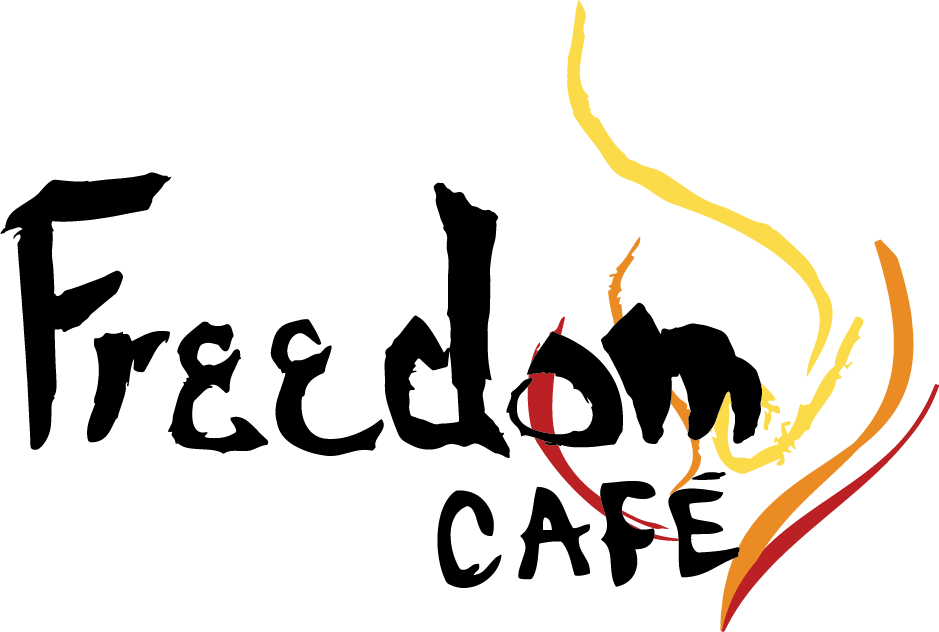Take a Step Toward a Traffick-free Country
By Colie Haahr
You may not know it yet, but you know someone whose life has been touched by human trafficking. Our very own country has put teenagers and children directly in the hands of traffickers. Runaways and homeless youth in our country will be approached by traffickers within 48 hours of being on the street. What country do you live in? What countries come to mind first? It’s time to acknowledge our misguided belief that human trafficking is a only problem in countries that are less developed than The United States. It’s a problem in our country. It’s a problem in your state. It may be happening in your city or town. It happens here. Until we accept that fact, nothing can be done to change it.
Since getting involved with the Freedom Cafe, I have been to three different talks by survivors of human trafficking. Though their stories were different, what I have found myself thinking each time is that it could happen to anyone. One of the most powerful parts of hearing a survivor speak is the collective realization of the audience: “That could be me.” Trafficking stories often start with the same thing- a relationship. We all have those. Some of us have been in relationships that became unhealthy, others, abusive. Trafficking victims get trapped in a relationship based on manipulation and coercion, and it happens to more people than we know about. According to nonprofit Ark of Hope For Children, up to 300,000 Americans under 18 are lured into the commercial sex trade every year. (https://arkofhopeforchildren.org/child-trafficking/child-trafficking-statistics). In 2017, the National Human Trafficking Hotline received over 26,000 calls, and reported over 8,000 cases of trafficking.( https://humantraffickinghotline.org/states). These numbers have doubled since 2012. The states with the most human trafficking cases in 2017 were California (1,305), Texas (792), Florida (604), Ohio (365) and New York (333).
Knowing these facts is not why I got involved with the Freedom Cafe. Getting involved with the Freedom Cafe is the reason that I know these facts. One of the first talks that I went to at the Freedom Cafe was a panel of experts from the NH Human Trafficking Task Force. The detective on the panel talked about the role of addiction in trafficking cases here in New Hampshire. While I wasn’t surprised by the link between trafficking and addiction, I was saddened by it. The Opioid crisis has led to more trafficking cases: people manipulated by drug dealers and sometimes forced to use drugs to become addicted. I thought this was sickening. I thought this was as ugly as humans can get.
As some people reading this may know, I lost my older brother this year after his nearly 20 year struggle with addiction. What you may not know is that my half sister passed away in 2009 after a 5 year struggle with addiction that involved a manipulative and abusive relationship with a drug dealer. While there are many layers to each of their stories, I can say that I loved them both dearly, and that they had friends and family who loved them, cared for them, and tried to help. It’s a hollow feeling knowing trafficking victims do not even have access to those who care about them. I know that there is hope for trafficking victims, but I am also aware of the reality that survivors may need many different levels of care and resources- some of which are scarce- to recover from addiction in addition to trafficking.
The recent news that the United States government put refugee children and teenagers in the hands of traffickers is bringing more awareness to trafficking, and with that, I hope, more action to protect the most vulnerable people in our country (https://www.nytimes.com/2016/01/29/us/politics/us-placed-immigrant-children-with-traffickers-report-says.html). I have not stopped thinking about the nearly 1500 other immigrant children that the government cannot account for. It hurts my heart knowing that they are at high risk of being trafficked in a country they came to for safety.
When asked recently why I got involved with the Freedom Cafe, I said “because human trafficking is a cause that everyone cares about if they know about it.” I think that the most important thing the Freedom Cafe does is educate people about trafficking and ethical consumption. There is a spirit of empowerment at the Freedom Cafe that allows people to be both hopeful and realistic about the path toward a traffick-free world. I feel most inspired by the past and present volunteers who I know will walk this path in their lives and their communities. I truly do not doubt the power of the ripple effect, and I hope that together we can make our country a safer place for vulnerable populations. For this and many other reasons, I am choosing to support the Freedom Cafe for New Hampshire Gives on June 6th. If you want to join me, you can take a step toward a traffick-free world here: https://www.nhgives.org/p2p/40927/colie-haahr-f776d06a-b71d-4ef4-aac7-e2602acc2e00
National Trafficking Hotline: 1-888-373-7888
*Colie is the STEAM and school aged programs coordinator at the Children’s Museum of New Hampshire and has served as a member of The Freedom Cafe Board since Jan. 2017.

